Future Implications of Changing Nature of Workplace Case Study 2022
VerifiedAdded on 2022/09/21
|7
|1487
|26
AI Summary
Contribute Materials
Your contribution can guide someone’s learning journey. Share your
documents today.
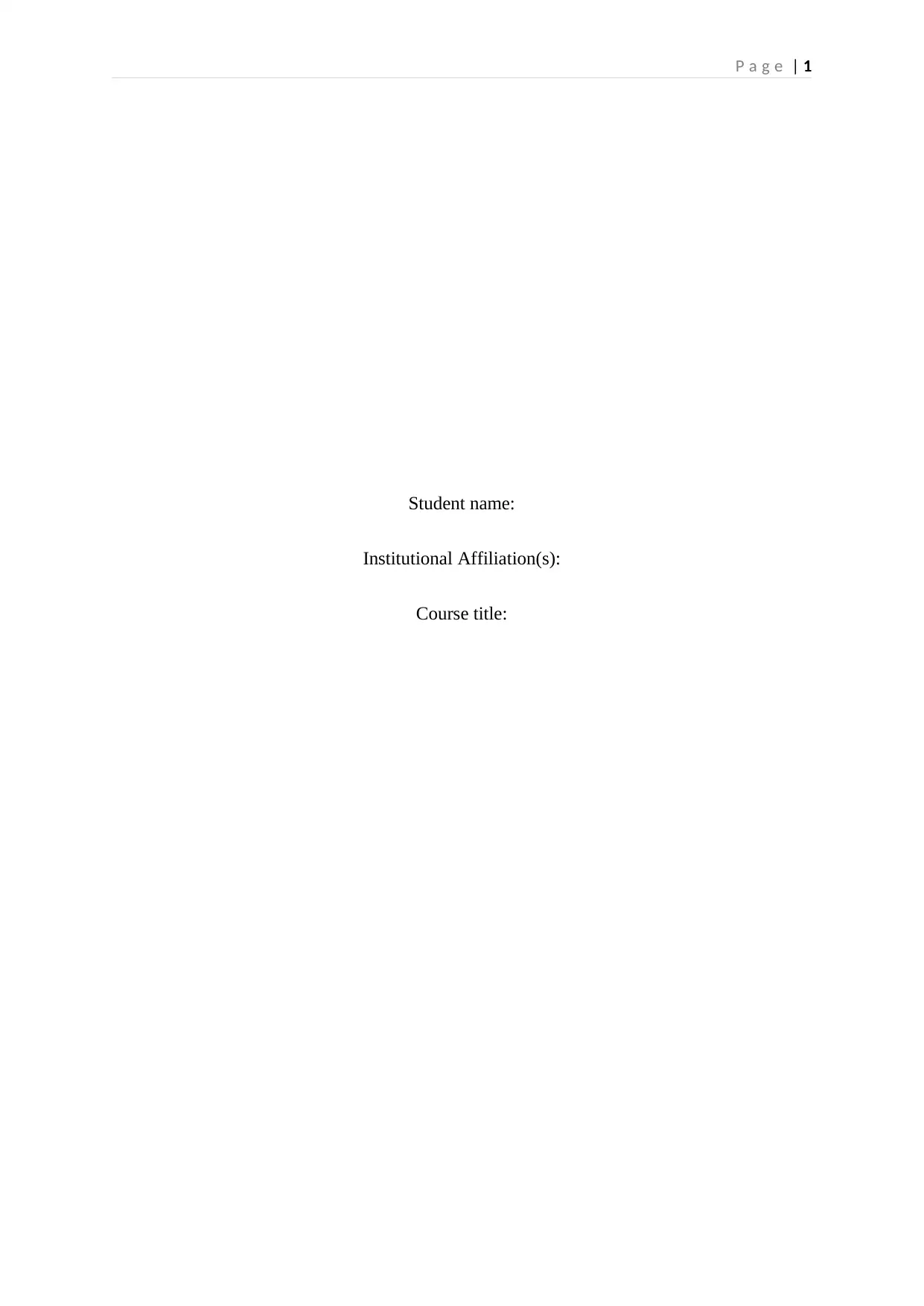
P a g e | 1
Student name:
Institutional Affiliation(s):
Course title:
Student name:
Institutional Affiliation(s):
Course title:
Secure Best Marks with AI Grader
Need help grading? Try our AI Grader for instant feedback on your assignments.
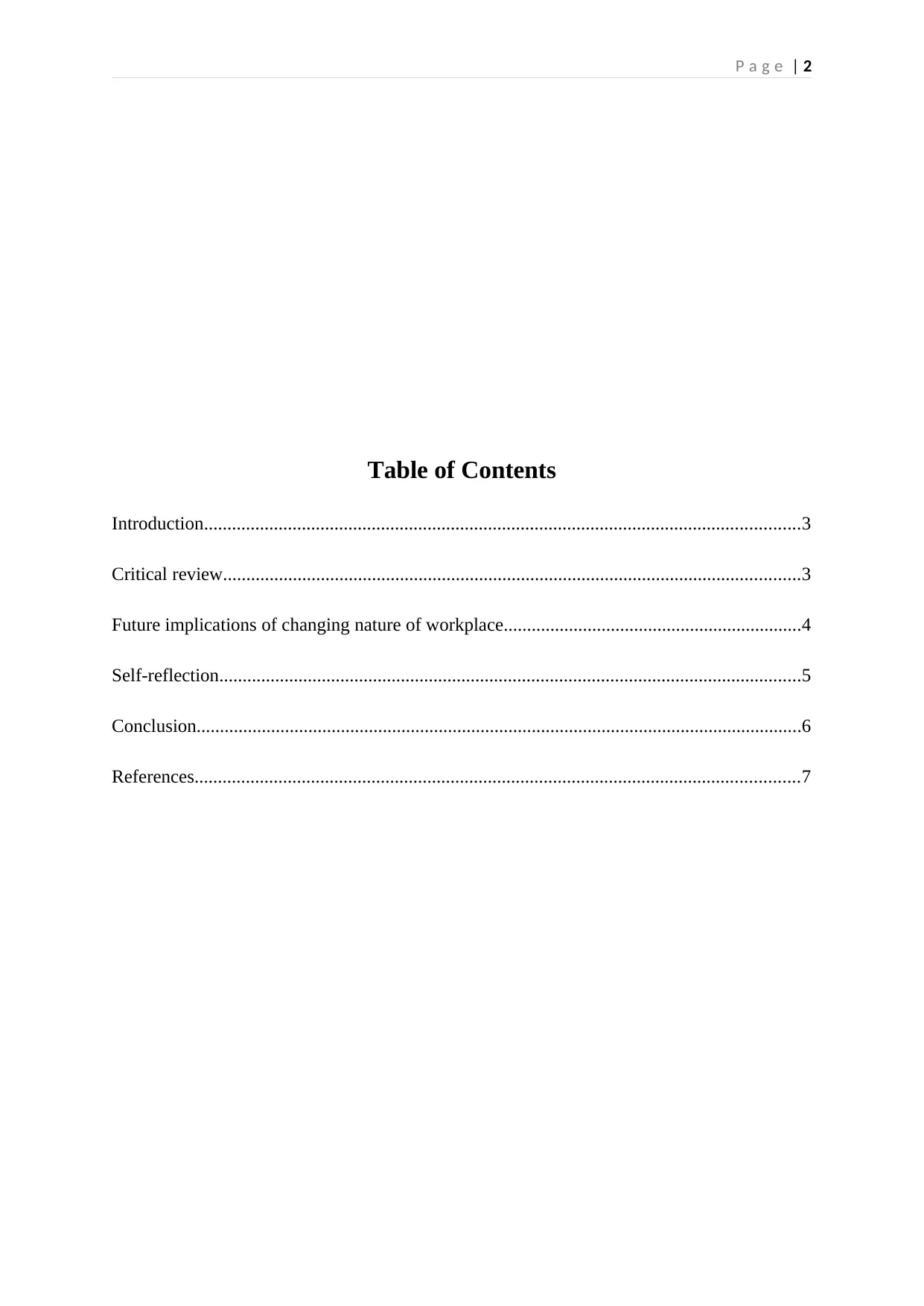
P a g e | 2
Table of Contents
Introduction................................................................................................................................3
Critical review............................................................................................................................3
Future implications of changing nature of workplace................................................................4
Self-reflection.............................................................................................................................5
Conclusion..................................................................................................................................6
References..................................................................................................................................7
Table of Contents
Introduction................................................................................................................................3
Critical review............................................................................................................................3
Future implications of changing nature of workplace................................................................4
Self-reflection.............................................................................................................................5
Conclusion..................................................................................................................................6
References..................................................................................................................................7
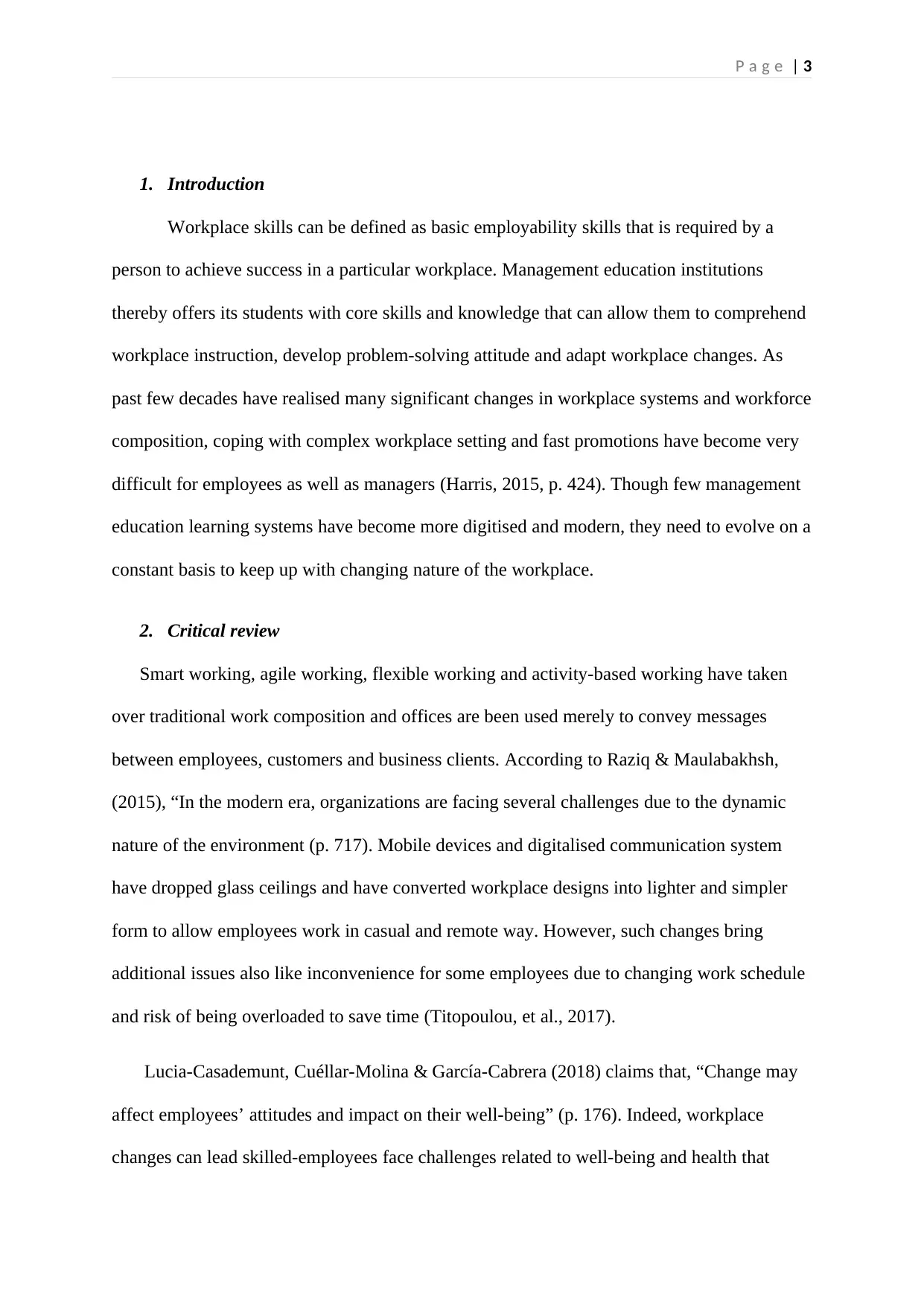
P a g e | 3
1. Introduction
Workplace skills can be defined as basic employability skills that is required by a
person to achieve success in a particular workplace. Management education institutions
thereby offers its students with core skills and knowledge that can allow them to comprehend
workplace instruction, develop problem-solving attitude and adapt workplace changes. As
past few decades have realised many significant changes in workplace systems and workforce
composition, coping with complex workplace setting and fast promotions have become very
difficult for employees as well as managers (Harris, 2015, p. 424). Though few management
education learning systems have become more digitised and modern, they need to evolve on a
constant basis to keep up with changing nature of the workplace.
2. Critical review
Smart working, agile working, flexible working and activity-based working have taken
over traditional work composition and offices are been used merely to convey messages
between employees, customers and business clients. According to Raziq & Maulabakhsh,
(2015), “In the modern era, organizations are facing several challenges due to the dynamic
nature of the environment (p. 717). Mobile devices and digitalised communication system
have dropped glass ceilings and have converted workplace designs into lighter and simpler
form to allow employees work in casual and remote way. However, such changes bring
additional issues also like inconvenience for some employees due to changing work schedule
and risk of being overloaded to save time (Titopoulou, et al., 2017).
Lucia-Casademunt, Cuéllar-Molina & García-Cabrera (2018) claims that, “Change may
affect employees’ attitudes and impact on their well-being” (p. 176). Indeed, workplace
changes can lead skilled-employees face challenges related to well-being and health that
1. Introduction
Workplace skills can be defined as basic employability skills that is required by a
person to achieve success in a particular workplace. Management education institutions
thereby offers its students with core skills and knowledge that can allow them to comprehend
workplace instruction, develop problem-solving attitude and adapt workplace changes. As
past few decades have realised many significant changes in workplace systems and workforce
composition, coping with complex workplace setting and fast promotions have become very
difficult for employees as well as managers (Harris, 2015, p. 424). Though few management
education learning systems have become more digitised and modern, they need to evolve on a
constant basis to keep up with changing nature of the workplace.
2. Critical review
Smart working, agile working, flexible working and activity-based working have taken
over traditional work composition and offices are been used merely to convey messages
between employees, customers and business clients. According to Raziq & Maulabakhsh,
(2015), “In the modern era, organizations are facing several challenges due to the dynamic
nature of the environment (p. 717). Mobile devices and digitalised communication system
have dropped glass ceilings and have converted workplace designs into lighter and simpler
form to allow employees work in casual and remote way. However, such changes bring
additional issues also like inconvenience for some employees due to changing work schedule
and risk of being overloaded to save time (Titopoulou, et al., 2017).
Lucia-Casademunt, Cuéllar-Molina & García-Cabrera (2018) claims that, “Change may
affect employees’ attitudes and impact on their well-being” (p. 176). Indeed, workplace
changes can lead skilled-employees face challenges related to well-being and health that
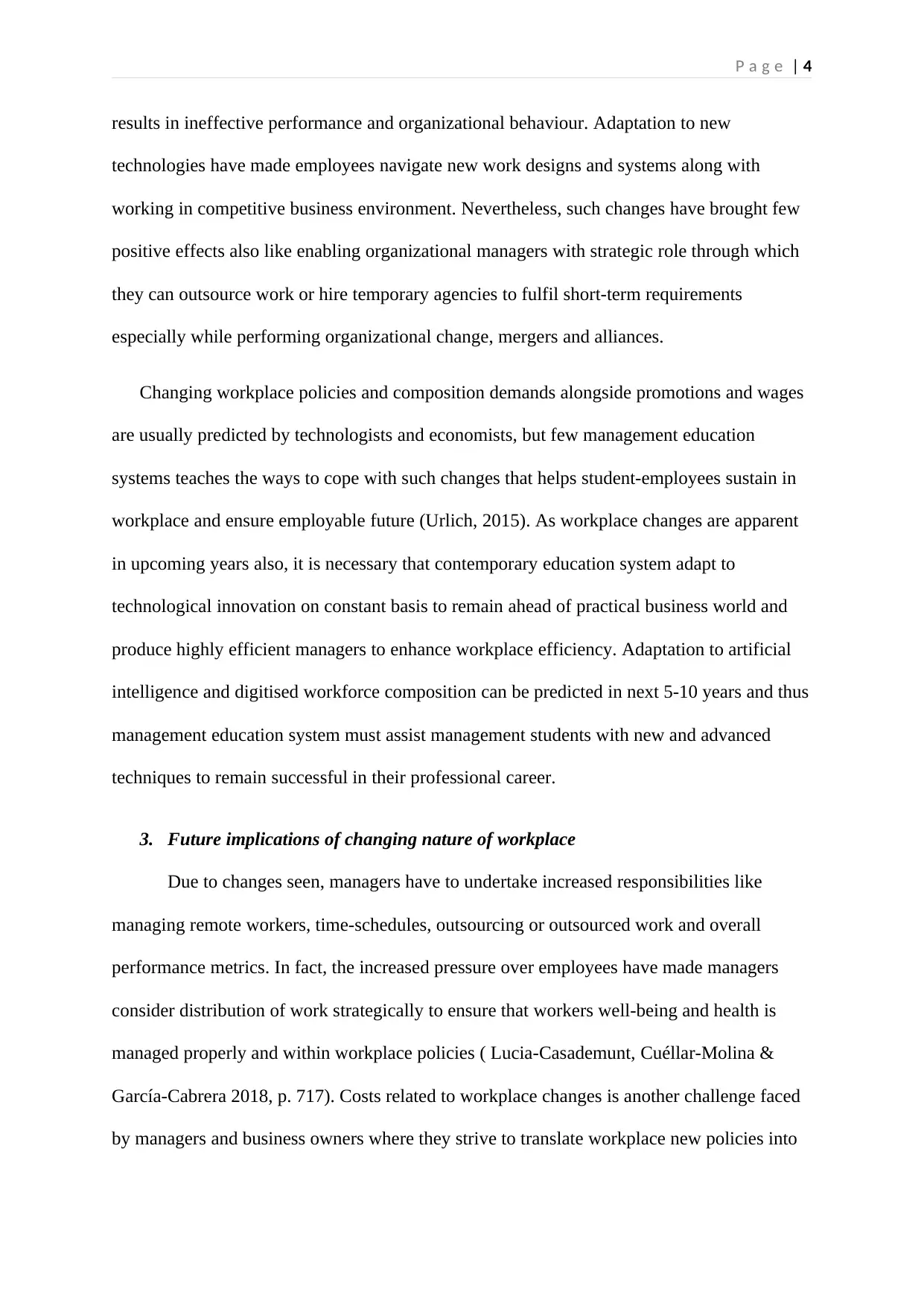
P a g e | 4
results in ineffective performance and organizational behaviour. Adaptation to new
technologies have made employees navigate new work designs and systems along with
working in competitive business environment. Nevertheless, such changes have brought few
positive effects also like enabling organizational managers with strategic role through which
they can outsource work or hire temporary agencies to fulfil short-term requirements
especially while performing organizational change, mergers and alliances.
Changing workplace policies and composition demands alongside promotions and wages
are usually predicted by technologists and economists, but few management education
systems teaches the ways to cope with such changes that helps student-employees sustain in
workplace and ensure employable future (Urlich, 2015). As workplace changes are apparent
in upcoming years also, it is necessary that contemporary education system adapt to
technological innovation on constant basis to remain ahead of practical business world and
produce highly efficient managers to enhance workplace efficiency. Adaptation to artificial
intelligence and digitised workforce composition can be predicted in next 5-10 years and thus
management education system must assist management students with new and advanced
techniques to remain successful in their professional career.
3. Future implications of changing nature of workplace
Due to changes seen, managers have to undertake increased responsibilities like
managing remote workers, time-schedules, outsourcing or outsourced work and overall
performance metrics. In fact, the increased pressure over employees have made managers
consider distribution of work strategically to ensure that workers well-being and health is
managed properly and within workplace policies ( Lucia-Casademunt, Cuéllar-Molina &
García-Cabrera 2018, p. 717). Costs related to workplace changes is another challenge faced
by managers and business owners where they strive to translate workplace new policies into
results in ineffective performance and organizational behaviour. Adaptation to new
technologies have made employees navigate new work designs and systems along with
working in competitive business environment. Nevertheless, such changes have brought few
positive effects also like enabling organizational managers with strategic role through which
they can outsource work or hire temporary agencies to fulfil short-term requirements
especially while performing organizational change, mergers and alliances.
Changing workplace policies and composition demands alongside promotions and wages
are usually predicted by technologists and economists, but few management education
systems teaches the ways to cope with such changes that helps student-employees sustain in
workplace and ensure employable future (Urlich, 2015). As workplace changes are apparent
in upcoming years also, it is necessary that contemporary education system adapt to
technological innovation on constant basis to remain ahead of practical business world and
produce highly efficient managers to enhance workplace efficiency. Adaptation to artificial
intelligence and digitised workforce composition can be predicted in next 5-10 years and thus
management education system must assist management students with new and advanced
techniques to remain successful in their professional career.
3. Future implications of changing nature of workplace
Due to changes seen, managers have to undertake increased responsibilities like
managing remote workers, time-schedules, outsourcing or outsourced work and overall
performance metrics. In fact, the increased pressure over employees have made managers
consider distribution of work strategically to ensure that workers well-being and health is
managed properly and within workplace policies ( Lucia-Casademunt, Cuéllar-Molina &
García-Cabrera 2018, p. 717). Costs related to workplace changes is another challenge faced
by managers and business owners where they strive to translate workplace new policies into
Secure Best Marks with AI Grader
Need help grading? Try our AI Grader for instant feedback on your assignments.
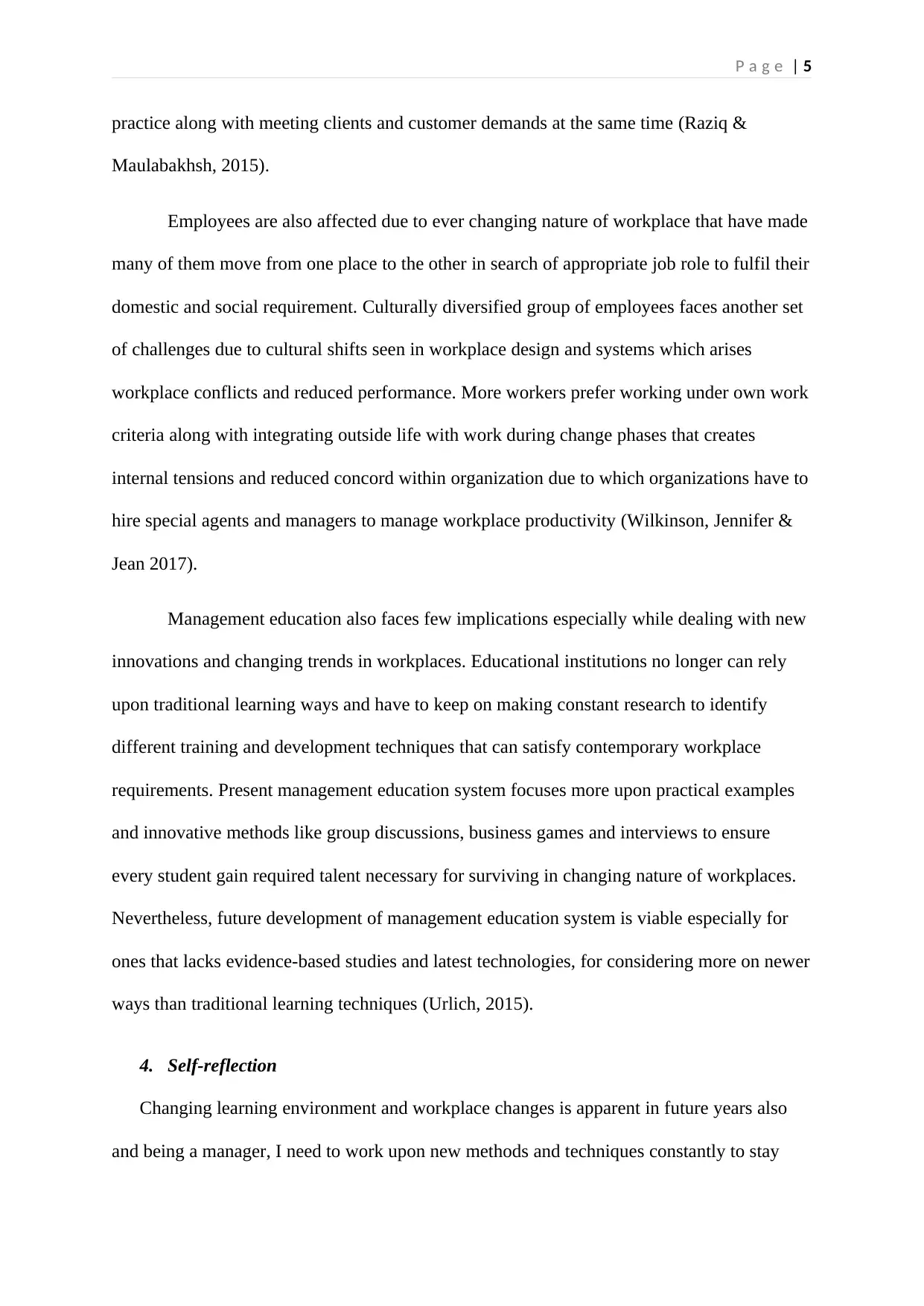
P a g e | 5
practice along with meeting clients and customer demands at the same time (Raziq &
Maulabakhsh, 2015).
Employees are also affected due to ever changing nature of workplace that have made
many of them move from one place to the other in search of appropriate job role to fulfil their
domestic and social requirement. Culturally diversified group of employees faces another set
of challenges due to cultural shifts seen in workplace design and systems which arises
workplace conflicts and reduced performance. More workers prefer working under own work
criteria along with integrating outside life with work during change phases that creates
internal tensions and reduced concord within organization due to which organizations have to
hire special agents and managers to manage workplace productivity (Wilkinson, Jennifer &
Jean 2017).
Management education also faces few implications especially while dealing with new
innovations and changing trends in workplaces. Educational institutions no longer can rely
upon traditional learning ways and have to keep on making constant research to identify
different training and development techniques that can satisfy contemporary workplace
requirements. Present management education system focuses more upon practical examples
and innovative methods like group discussions, business games and interviews to ensure
every student gain required talent necessary for surviving in changing nature of workplaces.
Nevertheless, future development of management education system is viable especially for
ones that lacks evidence-based studies and latest technologies, for considering more on newer
ways than traditional learning techniques (Urlich, 2015).
4. Self-reflection
Changing learning environment and workplace changes is apparent in future years also
and being a manager, I need to work upon new methods and techniques constantly to stay
practice along with meeting clients and customer demands at the same time (Raziq &
Maulabakhsh, 2015).
Employees are also affected due to ever changing nature of workplace that have made
many of them move from one place to the other in search of appropriate job role to fulfil their
domestic and social requirement. Culturally diversified group of employees faces another set
of challenges due to cultural shifts seen in workplace design and systems which arises
workplace conflicts and reduced performance. More workers prefer working under own work
criteria along with integrating outside life with work during change phases that creates
internal tensions and reduced concord within organization due to which organizations have to
hire special agents and managers to manage workplace productivity (Wilkinson, Jennifer &
Jean 2017).
Management education also faces few implications especially while dealing with new
innovations and changing trends in workplaces. Educational institutions no longer can rely
upon traditional learning ways and have to keep on making constant research to identify
different training and development techniques that can satisfy contemporary workplace
requirements. Present management education system focuses more upon practical examples
and innovative methods like group discussions, business games and interviews to ensure
every student gain required talent necessary for surviving in changing nature of workplaces.
Nevertheless, future development of management education system is viable especially for
ones that lacks evidence-based studies and latest technologies, for considering more on newer
ways than traditional learning techniques (Urlich, 2015).
4. Self-reflection
Changing learning environment and workplace changes is apparent in future years also
and being a manager, I need to work upon new methods and techniques constantly to stay
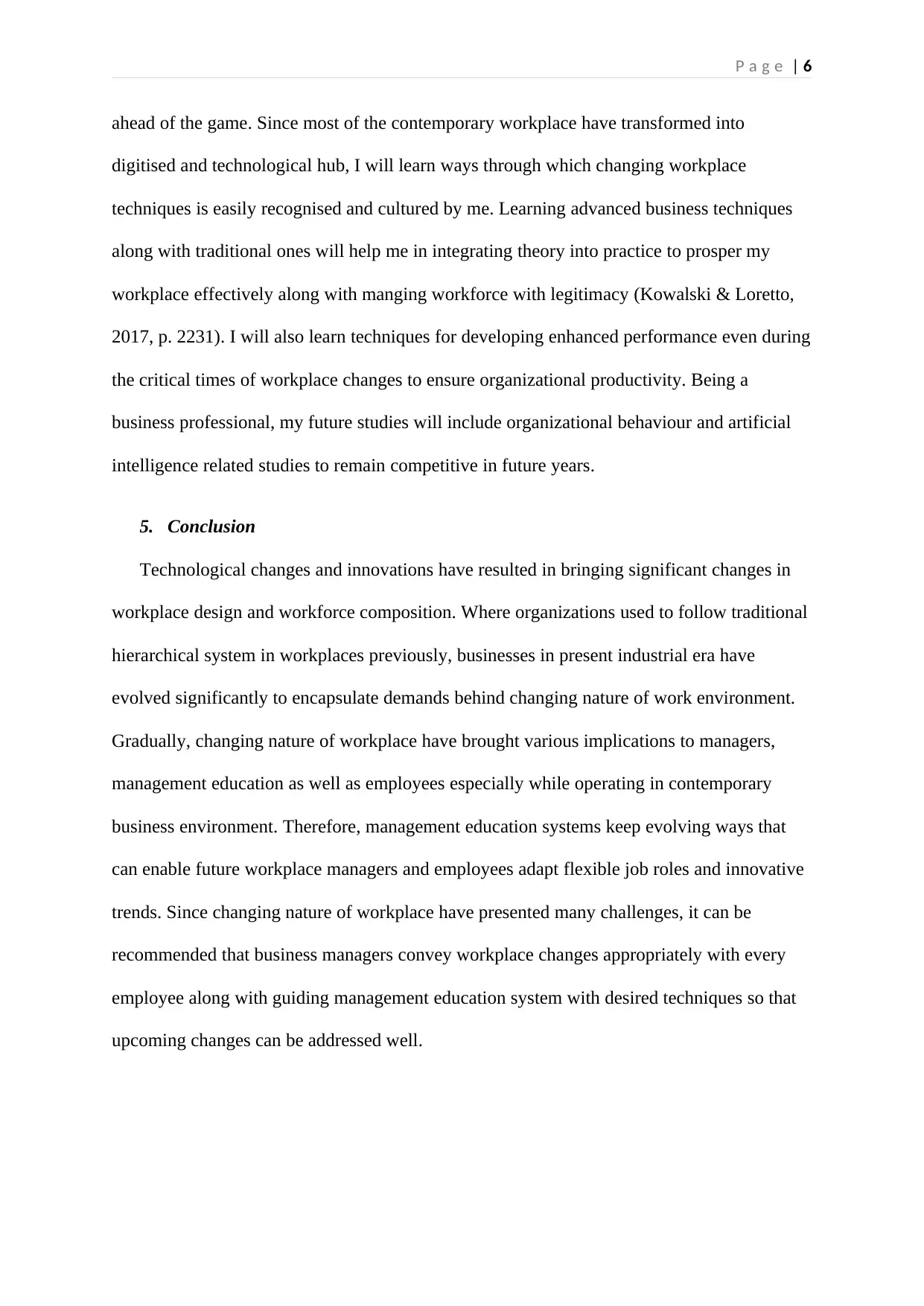
P a g e | 6
ahead of the game. Since most of the contemporary workplace have transformed into
digitised and technological hub, I will learn ways through which changing workplace
techniques is easily recognised and cultured by me. Learning advanced business techniques
along with traditional ones will help me in integrating theory into practice to prosper my
workplace effectively along with manging workforce with legitimacy (Kowalski & Loretto,
2017, p. 2231). I will also learn techniques for developing enhanced performance even during
the critical times of workplace changes to ensure organizational productivity. Being a
business professional, my future studies will include organizational behaviour and artificial
intelligence related studies to remain competitive in future years.
5. Conclusion
Technological changes and innovations have resulted in bringing significant changes in
workplace design and workforce composition. Where organizations used to follow traditional
hierarchical system in workplaces previously, businesses in present industrial era have
evolved significantly to encapsulate demands behind changing nature of work environment.
Gradually, changing nature of workplace have brought various implications to managers,
management education as well as employees especially while operating in contemporary
business environment. Therefore, management education systems keep evolving ways that
can enable future workplace managers and employees adapt flexible job roles and innovative
trends. Since changing nature of workplace have presented many challenges, it can be
recommended that business managers convey workplace changes appropriately with every
employee along with guiding management education system with desired techniques so that
upcoming changes can be addressed well.
ahead of the game. Since most of the contemporary workplace have transformed into
digitised and technological hub, I will learn ways through which changing workplace
techniques is easily recognised and cultured by me. Learning advanced business techniques
along with traditional ones will help me in integrating theory into practice to prosper my
workplace effectively along with manging workforce with legitimacy (Kowalski & Loretto,
2017, p. 2231). I will also learn techniques for developing enhanced performance even during
the critical times of workplace changes to ensure organizational productivity. Being a
business professional, my future studies will include organizational behaviour and artificial
intelligence related studies to remain competitive in future years.
5. Conclusion
Technological changes and innovations have resulted in bringing significant changes in
workplace design and workforce composition. Where organizations used to follow traditional
hierarchical system in workplaces previously, businesses in present industrial era have
evolved significantly to encapsulate demands behind changing nature of work environment.
Gradually, changing nature of workplace have brought various implications to managers,
management education as well as employees especially while operating in contemporary
business environment. Therefore, management education systems keep evolving ways that
can enable future workplace managers and employees adapt flexible job roles and innovative
trends. Since changing nature of workplace have presented many challenges, it can be
recommended that business managers convey workplace changes appropriately with every
employee along with guiding management education system with desired techniques so that
upcoming changes can be addressed well.
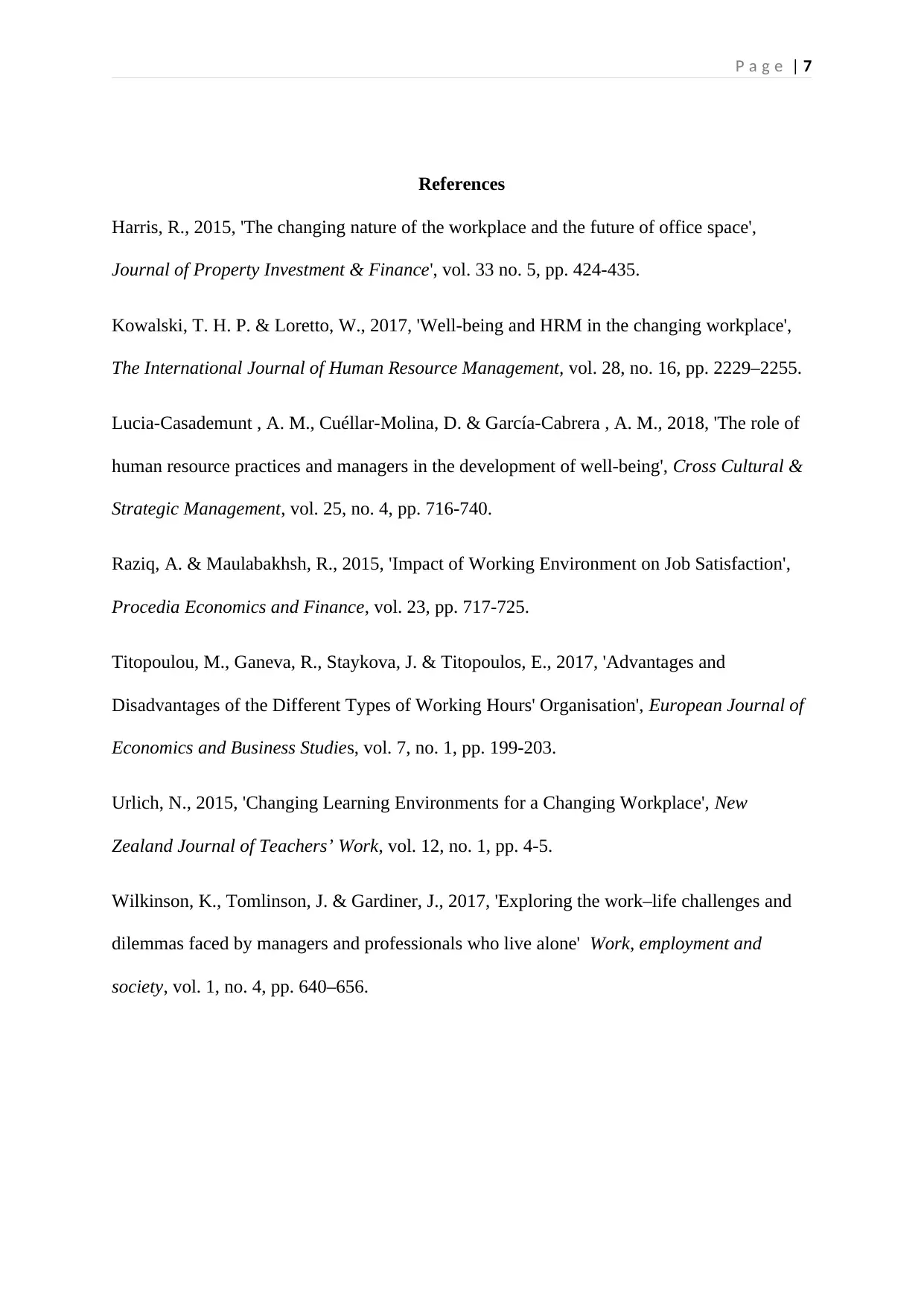
P a g e | 7
References
Harris, R., 2015, 'The changing nature of the workplace and the future of office space',
Journal of Property Investment & Finance', vol. 33 no. 5, pp. 424-435.
Kowalski, T. H. P. & Loretto, W., 2017, 'Well-being and HRM in the changing workplace',
The International Journal of Human Resource Management, vol. 28, no. 16, pp. 2229–2255.
Lucia-Casademunt , A. M., Cuéllar-Molina, D. & García-Cabrera , A. M., 2018, 'The role of
human resource practices and managers in the development of well-being', Cross Cultural &
Strategic Management, vol. 25, no. 4, pp. 716-740.
Raziq, A. & Maulabakhsh, R., 2015, 'Impact of Working Environment on Job Satisfaction',
Procedia Economics and Finance, vol. 23, pp. 717-725.
Titopoulou, M., Ganeva, R., Staykova, J. & Titopoulos, E., 2017, 'Advantages and
Disadvantages of the Different Types of Working Hours' Organisation', European Journal of
Economics and Business Studies, vol. 7, no. 1, pp. 199-203.
Urlich, N., 2015, 'Changing Learning Environments for a Changing Workplace', New
Zealand Journal of Teachers’ Work, vol. 12, no. 1, pp. 4-5.
Wilkinson, K., Tomlinson, J. & Gardiner, J., 2017, 'Exploring the work–life challenges and
dilemmas faced by managers and professionals who live alone' Work, employment and
society, vol. 1, no. 4, pp. 640–656.
References
Harris, R., 2015, 'The changing nature of the workplace and the future of office space',
Journal of Property Investment & Finance', vol. 33 no. 5, pp. 424-435.
Kowalski, T. H. P. & Loretto, W., 2017, 'Well-being and HRM in the changing workplace',
The International Journal of Human Resource Management, vol. 28, no. 16, pp. 2229–2255.
Lucia-Casademunt , A. M., Cuéllar-Molina, D. & García-Cabrera , A. M., 2018, 'The role of
human resource practices and managers in the development of well-being', Cross Cultural &
Strategic Management, vol. 25, no. 4, pp. 716-740.
Raziq, A. & Maulabakhsh, R., 2015, 'Impact of Working Environment on Job Satisfaction',
Procedia Economics and Finance, vol. 23, pp. 717-725.
Titopoulou, M., Ganeva, R., Staykova, J. & Titopoulos, E., 2017, 'Advantages and
Disadvantages of the Different Types of Working Hours' Organisation', European Journal of
Economics and Business Studies, vol. 7, no. 1, pp. 199-203.
Urlich, N., 2015, 'Changing Learning Environments for a Changing Workplace', New
Zealand Journal of Teachers’ Work, vol. 12, no. 1, pp. 4-5.
Wilkinson, K., Tomlinson, J. & Gardiner, J., 2017, 'Exploring the work–life challenges and
dilemmas faced by managers and professionals who live alone' Work, employment and
society, vol. 1, no. 4, pp. 640–656.
1 out of 7
Related Documents
Your All-in-One AI-Powered Toolkit for Academic Success.
+13062052269
info@desklib.com
Available 24*7 on WhatsApp / Email
![[object Object]](/_next/static/media/star-bottom.7253800d.svg)
Unlock your academic potential
© 2024 | Zucol Services PVT LTD | All rights reserved.





